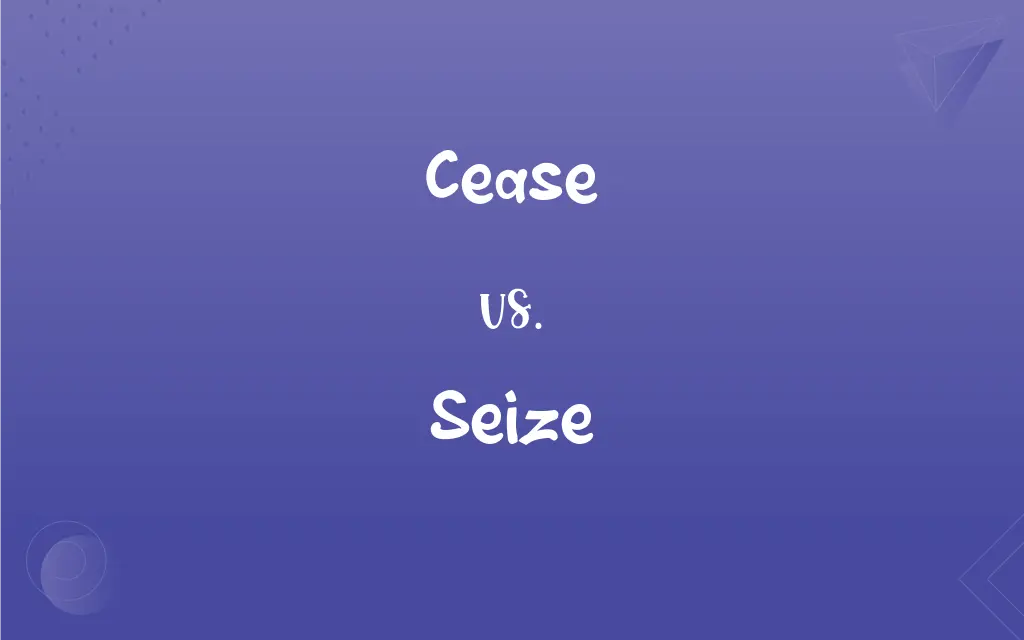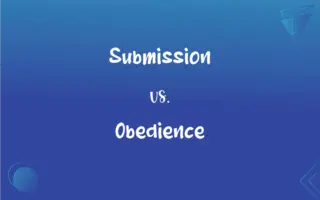Cease vs. Seize: What's the Difference?
By Janet White || Published on March 16, 2024
"Cease" means to stop or come to an end, while "seize" means to take hold of suddenly or forcibly.

Key Differences
"Cease" is a verb that means to stop something or bring it to an end. It is often used in formal contexts or legal language. On the other hand, "seize" is a verb that means to take hold of something quickly and firmly, often with authority or force. It can also imply taking advantage of an opportunity.
"Cease" is commonly used in contexts related to stopping actions, processes, or behaviors. It carries a neutral or formal tone. "Seize," however, is used in more dynamic contexts, involving physical actions or taking control. It can have a more aggressive or assertive connotation.
"Cease" is often used in the phrase "cease and desist," which is a legal term used to demand someone to stop doing something. "Seize" forms part of expressions like "seize the day," which means to make the most of the present moment.
Synonyms for "cease" include stop, halt, and discontinue. For "seize," synonyms include grab, capture, and snatch. Antonyms for "cease" would be start, begin, or commence, while for "seize," they would be release, let go, or relinquish.
"Cease" comes from the Old French word "cesser," which means to come to an end or stop. "Seize" originates from the Old French word "saisir," meaning to take possession of or to take by force.
ADVERTISEMENT
Comparison Chart
Meaning
To stop or come to an end
To take hold of suddenly
Usage
Formal, legal contexts
Dynamic, forceful contexts
Common Phrases
"Cease and desist"
"Seize the day"
Synonyms
Stop, halt, discontinue
Grab, capture, snatch
Etymology
From Old French "cesser"
From Old French "saisir"
ADVERTISEMENT
Cease and Seize Definitions
Cease
To come to an end.
The rain will cease by the afternoon.
Seize
To take hold of suddenly.
The police were able to seize the suspect.
Cease
To stop.
The company decided to cease operations due to financial difficulties.
Seize
To take by force.
The rebels tried to seize control of the city.
Cease
To discontinue.
They agreed to cease all communication.
Seize
To grasp.
He seized the opportunity to start his own business.
Cease
To halt.
The government ordered to cease all construction activities.
Seize
To take possession of.
The bank seized the property due to unpaid debts.
Cease
To terminate.
The contract will cease to be effective next month.
Seize
To capture.
The army managed to seize the enemy's stronghold.
Cease
To put an end to; discontinue
The factory ceased production.
Seize
To grasp suddenly and forcibly; take or grab
Seize a sword.
Cease
To come to an end; stop
A process that never ceases.
Seize
To take by force; capture or conquer
The kidnappers seized the prince. The invaders seized the city.
FAQs
Can "cease" be used in informal contexts?
"Cease" is typically used in formal or legal contexts.
What is the difference between "cease" and "seize"?
"Cease" means to stop or end, while "seize" means to take hold of or capture.
What are some synonyms for "cease"?
Synonyms include stop, halt, and discontinue.
Can "cease" be used as a noun?
No, "cease" is typically used as a verb.
Are there any common phrases with "cease"?
Yes, "cease and desist" is a common legal phrase.
Is "seize" always used in a negative sense?
No, "seize" can be used positively, as in "seize the opportunity."
What are some synonyms for "seize"?
Synonyms include grab, capture, and snatch.
Can "seize" be used in a non-physical sense?
Yes, it can be used metaphorically, as in "seize an opportunity."
What is the opposite of "cease"?
The opposite is start, begin, or commence.
Is "cease" commonly used in everyday language?
"Cease" is more common in formal or legal contexts.
How is "cease" used in legal language?
It is used in terms like "cease and desist" to demand stopping an action.
What is the opposite of "seize"?
The opposite is release, let go, or relinquish.
Is "seize" commonly used in everyday language?
"Seize" is used in both everyday and formal language.
Are there any idioms with "seize"?
Yes, "seize the day" is a popular idiom.
What is the etymology of "seize"?
It originates from the Old French word "saisir."
Can "seize" imply taking advantage of something?
Yes, it can imply taking advantage of an opportunity.
Can "cease" and "seize" be used interchangeably?
No, they have different meanings and cannot be used interchangeably.
What is the etymology of "cease"?
It comes from the Old French word "cesser."
Is "cease" a strong word?
It is a formal word, often used in serious or legal contexts.
Is "seize" a strong word?
Yes, it often implies force or urgency.
About Author
Written by
Janet WhiteJanet White has been an esteemed writer and blogger for Difference Wiki. Holding a Master's degree in Science and Medical Journalism from the prestigious Boston University, she has consistently demonstrated her expertise and passion for her field. When she's not immersed in her work, Janet relishes her time exercising, delving into a good book, and cherishing moments with friends and family.































































